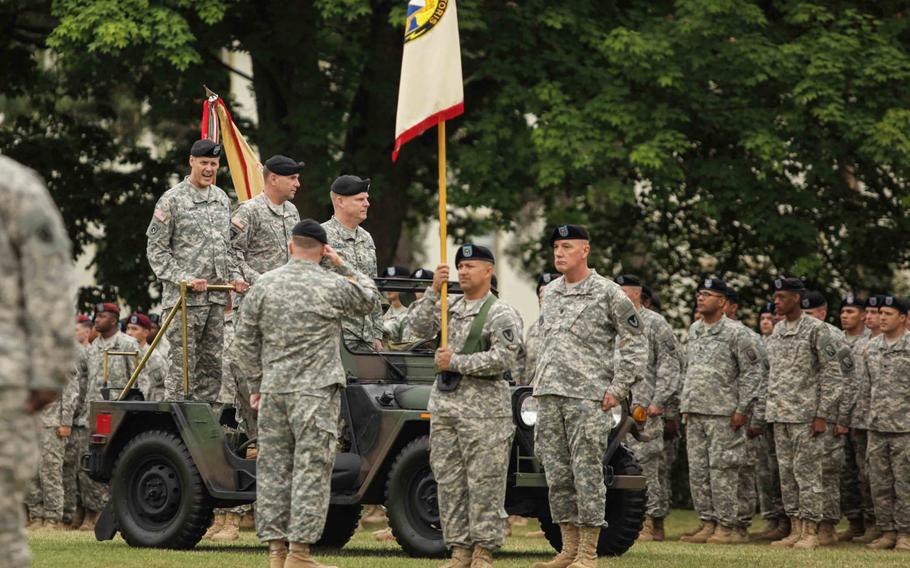
Maj. Gen. John R. O'Connor, outgoing commander of the 21st Theater Sustainment Command, Lt. Gen. Ben Hodges , commander of U.S. Army Europe, and Maj. Gen. Duane A. Gamble, the new commander of the 21st, ride in a jeep while trooping the line at the TSC's change of command ceremony Wednesday, June 24, 2015, in Kaiserslautern, Germany. (Matt Millham/Stars and Stripes)
KAISERSLAUTERN, Germany — The unit behind the Army’s efforts to combat Ebola in Africa and amass tanks and other equipment to counter Russian aggression in Europe got a new commander Wednesday.
Maj. Gen. Duane A. Gamble replaced Maj. Gen. John R. O’Connor as commander of the 21st Theater Sustainment Command — the U.S. military’s primary logistics unit in Europe — in a ceremony that was by turns serious and funny.
The change came a day after Defense Secretary Ash Carter announced the U.S. would position a brigade’s worth of Abrams tanks, artillery and other equipment from the Baltic Sea to the Black Sea in a bid to reassure allies in the east and curb Russian aggression.
U.S. Army Europe commander Lt. Gen. Ben Hodges told the hundreds of personnel, civilians and allies in attendance that he was sure nobody on the field wanted to wind up in an emergency situation.
“And I am convinced that the best way to make sure that there never is an emergency, that we never have to actually execute any contingency, is by demonstrating that we are always ready.”
One small move in that direction is a plan to repaint all of the vehicles in Europe from the desert tan used for deployments to Iraq and Afghanistan back to camouflage green, which most Army vehicles in Europe had before the wars.
“Remember, we used to have paint sheds all over the place. And we repainted vehicles once a year,” Hodges told the crowd, which included dozens of German officials and military officers. “I don’t think there’s three liters of green paint in Europe anymore, at least something that doesn’t violate 20 EU regulations.”
A battalion from the 21st has been tasked to NATO’s new Spearhead task force, established in the wake of Russia’s annexation of Crimea from Ukraine last year, because NATO members “want American logistics,” Hodges said.
Hodges and O’Connor, who is retiring, both cracked jokes about a military working dog that jumped and strained at its leash in formation during parts of the nearly hourlong ceremony. A canon salute sent the dog into a frenzy, while another dog in the formation lay quietly through the commotion.
“Ladies and gentlemen, I draw your attention to those two beautiful dogs to your front, especially you, Duane,” O’Connor said, calling his replacement’s attention. “If you look to the right, the brown one, that was me 24 months ago. Full of energy. Jumping all around. Ears pointing north. Excited to be held by my handler, the CG. And today, look at the dog on the left. That’s gonna be me, T-minus 12 hours.”
O’Connor spent two years as head of the 21st, the first overseeing the unit’s reorganization and the movement of equipment back to the U.S. as forces in Europe drew down.
“Then, the second year hit,” he said. “We saw emerging threats in Europe and we had to reset our readiness posture again, looking at how we would support the defense of Europe with fewer assets than before.”
TSC soldiers were the first Americans to deploy to Africa to establish Ebola treatment centers. The unit also established and ran the U.S. transit hub in Romania after the U.S. lost its lease on a similar base in Kyrgyzstan, which handled the lion’s share of troops redeploying from Afghanistan. Since opening in February 2014, 172,000 personnel have passed through the Romanian hub, O’Connor said.
“Quite frankly, this is exactly where I wanted to command at the two-star level,” Gamble said in an interview after the ceremony.
Gamble, who earlier served under Hodges in the 101st Airborne Division, is coming from the Pentagon and previously served in Iraq and Afghanistan, he said. “I think the team here, to include the whole USAREUR team, is operating in the way we see the whole Army operating in the future … small, decentralized engagement with partner nations and allied nations, and we’re getting to do that right here every day.”
The unit will “have a big part” of the U.S. plan to base heavy equipment in the Baltics and other parts of eastern Europe, he said.
millham.matthew@stripes.com Twitter: @mattmillham